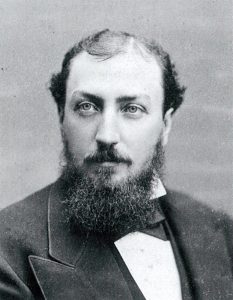
Price, Postel & Parma’s longest-serving attorney, Jarrett T. Richards was an active partner in the firm for over 53 years.
Although Richards was only 25 years old when he joined the firm, his life, like Fernald’s, had already been eventful. Richards was born in 1842 in Chambersburg, Pennsylvania. After attending preparatory schools in Switzerland and Germany, he returned to Chambersburg in 1863 to study law. The Civil War, which began two years earlier, was then nearing its climax.
During the summer of 1863, Confederate General Robert E. Lee began his second and last invasion of the North. Lee’s forces swept into Pennsylvania, occupied Chambersburg, and then turned east to engage the main Union army at nearby Gettysburg. Lee’s forces were defeated after a titanic struggle which proved to be the turning point of the war.
Four months later, in November 1863, Richards rode to Gettysburg for the dedication of the Soldiers’ National Cemetery, honoring those who had fallen in the battle. The principal speaker was Edward Everett, the nation’s foremost orator, who spoke for two hours. Abraham Lincoln also attended. As the Commander-in-Chief, it was appropriate that he say a few words. Although Lincoln spoke for only a few minutes, Richards was profoundly moved by the Gettysburg Address, and he remarked on the effect of the gaunt-faced president’s words for the rest of his life.
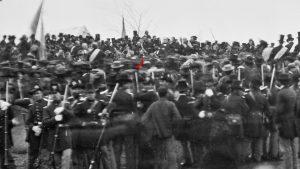
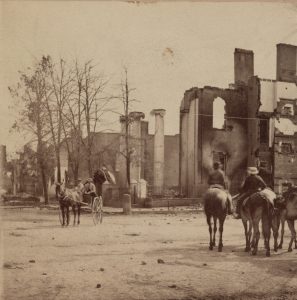
The Civil War was far from over, however, and in July 1864 Confederate cavalry under General Jubal Early burned Chambersburg to the ground. Richards gathered his few surviving possessions and made his way to New York, where he gained admission to Columbia Law School. After graduating with top honors in 1866, Richards was admitted to the bar and practiced for a year with a New York City law firm.
In 1867 Richards traveled west in search of new opportunities and a dryer climate. He arrived in Santa Barbara on horseback in the autumn of that year. Impressed by Richards’ academic credentials – in the 1860s, only 4 percent of California’s attorneys were law school graduates – Judge Fernald made Richards a junior partner in his busy law office. By 1871 Richards was making 15 percent of all appearances in the Santa Barbara District Court.
In his autobiographical novel, Romance on El Camino Real, Richards vividly described the practice of law in frontier Santa Barbara. “Quite a commodious courtroom did duty for two courts alternatively, the Santa Barbara in the 1880s district court, which had jurisdiction over [Santa Barbara] and two neighboring counties, and the county court. After a criminal received his sentence, he was, without trouble, marched from the courtroom through the sheriff’s office, into the adjoining jail, from which, it being with the entire building of soft adobe, he could, when night came, quietly dig himself out, leave the country and save the county future expense.”
The pace of business was slow. “A half-hour leeway was always given to keep an appointment. There was a universal habit of procrastinating, or putting off everything to be done until ‘manana.'” Even the court “was in the habit of taking a recess every quarter of an hour of five minutes, to enable the officers to smoke.”

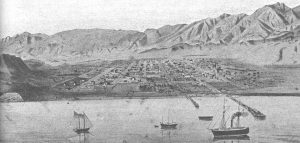
Richards extolled Santa Barbara’s physical setting. “The climate is superior to that of Italy. The mountains shield it from the northern blasts, making winter but a name for a few months of the year; while the breeze from the ocean fans away the heat of summer. The winter is probably the pleasantest portion of the year, especially to those who love to hear the occasional pattering and splashing of the rain and scent its fragrance and see nature awake at its quickening touch.”
Richards’ one complaint concerned Santa Barbara’s abundant fleas. “They seem to have a patriot’s love for the old adobe houses, and whenever the rooms are cleaned and a dust pan of supposed dirt is taken from the corner where it has been swept, invariably about a third of the contents of the pan leap to the floor.” Richards described an ingenious method used by the padres to control fleas in the Mission: “It was customary every Saturday evening, in order to secure uninterrupted devotion on Sunday, to drive a band of sheep through the church, for whom the fleas have a particular fondness.”
Romance on El Camino Real was published in 1914, six years before Richards passed away.
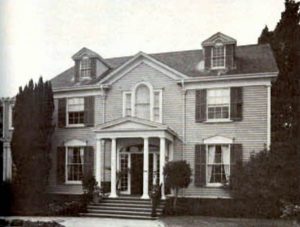
Previous Chapter
The Fernald MansionNext Chapter
1869 to 1895
